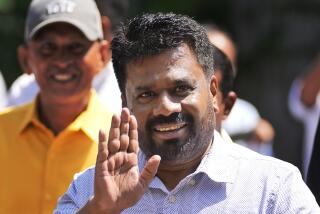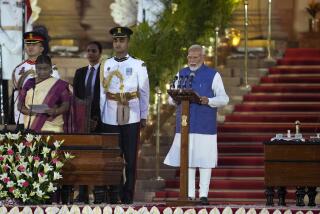Gandhi Accepts the ‘People’s Verdict’ : India: He promises to be a “very good watchdog” in his new role as opposition leader.
- Share via
NEW DELHI — Rajiv Gandhi, who resigned as India’s prime minister earlier in the day, said Wednesday that “the people have given their verdict and, in all humility, we accept the verdict.”
Gandhi had just come from a meeting at which his party, the Congress-I, decided to step aside and give the opposition a clear path to power as the result of elections that had stripped away Congress-I’s majority in Parliament.
“A new government will be formed,” he told the press, “and we extend to them our good wishes.”
Gandhi said he rejected the conclusion of most Indian analysts that the results of the election--three days of voting that ended Sunday--were a repudiation of his five years in power.
He blamed his defeat on religious fundamentalism, saying that the opposition had exploited religious tension between Muslims and the majority Hindus--a charge the opposition has leveled at him. He pointed to the strong showing of the Hindu party Bharatiya Janata, which won 90 seats, compared to just two in the 1984 election.
He seemed almost relieved to be rid of the burden of governing India’s 830 million people. But he said he is looking forward to his new role as leader of the opposition.
“I will be a very good watchdog,” he said.
It was Gandhi’s first public appearance since the campaign ended. His head was covered with rose petals showered on him at the party meeting, where he had been unanimously reelected as party president.
Asked whether the National Front, the opposition coalition, will be able to form a stable government, Gandhi winked and replied, “I hope so, because somebody has got to run the country.”
No single party received a majority of the votes, leaving Gandhi as caretaker prime minister until a new government is formed.
The Congress party, which was led by Gandhi’s grandfather, Jawaharlal Nehru, and later by his mother, Indira Gandhi, was the largest single vote-getter and will have 190 of the 543 seats in Parliament. The National Front, which will have 140, has been promised the support of the rightist Bharatiya Janata and the Communists. The right and left have both rejected the idea of a coalition with Congress-I.
The National Front had been expected to announce the organization of a new government today, but this has been postponed until Friday, raising concern that old rivalries and squabbling are delaying the process.
National Front sources conceded that a power struggle had developed, pitting supporters of Vishwanath Pratap Singh, a former defense minister who led the opposition in the campaign, against those of Chandra Shekhar, who like Singh is a member of Janata Dal, or the People’s Party.
A Western diplomat said that if the National Front people continue to bicker, “they’re finished.”
In the Gandhi camp, a leading figure commented that “one of the reasons for the great optimism here is the state of the opposition.”
Mobassar Javed Akbar, a former editor who won a seat in Parliament, said: “They’ll form a government, and it will fall apart. Already, within just 48 hours, there’s a Rajiv sympathy wave starting.”
END OF A DYNASTY
Rajiv Gandhi’s resignation marks the end to 38 years of nearly continuous family rule over India. He is the son of Prime Minister Indira Gandhi and the grandson of the nation’s first prime minister, Jawaharlal Nehru.
He was born Aug. 20, 1944, in Bombay. (He is not related to Indian independence leader Mohandas K. Gandhi). He attended Cambridge University in England, where he meet his bride-to-be, Italian Sonia Maino. An avid pilot, he flew commercial airliners for 14 years.
Two events thrust him into national leadership. In 1980, his politically active brother Sanjay died in an accident.
In October, 1984, his mother was assassinated. Gandhi insists he did not covet high office. But family succession is an Indian tenet. He succeeded her, and two months later was elected to the post.
At first, he won praise by bringing peace accords to Punjab, Assam and Mizoram states, attacking corruption and cultivating Western ties. But over the last two years, Hindu-Muslim violence erupted, hundreds of Indian soldiers died trying to enforce a peace plan in nearby Sri Lanka and corruption scandals were uncovered. These factors helped defeat his Congress-I party at the polls.
More to Read
Sign up for Essential California
The most important California stories and recommendations in your inbox every morning.
You may occasionally receive promotional content from the Los Angeles Times.













